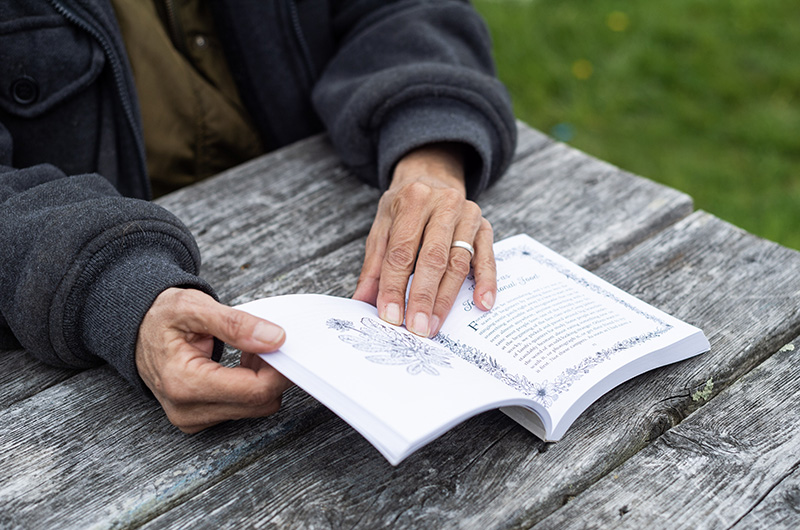Rebecca Gilbert calls herself The Weed Lady because plants have fed, cured and cared for her since her youngest days on the Vineyard. And today, as she roams the fields of Native Earth Teaching Farm in Chilmark where she lives, she is still talking to plants that are descended from those she spoke to and ate as a child on this same patch of North Road land.
“I consider the weeds to be very dear friends,” she said in a recent interview with the Gazette. “They give me free advice, like friends often do. I sometimes listen. I feel we have a relationship and that’s something I enjoy.”
For the last two decades at the farm and around the Island, Ms. Gilbert has shared her experience of observing, talking to, listening to and harvesting plants. Soon that wisdom will reach a wider audience. Weedy Wisdom for the Curious Forager, her long-awaited book of practical plant knowledge, is being published by Llewelyn Press and will be available later this summer. The book grew directly out of workshops she held with Camp Jabberwocky but also includes wisdom and recipes learned through practical living.
Ms. Gilbert’s dedication to the earth began early. At age six, she spent a summer with her grandparents on their farm, now known as Native Earth. For a time her grandparents lived in Spain trying to make it as Impressionist painters, but returned to the United States at the onset of the Spanish Civil War. Her grandmother recognized that the couple wasn’t going to get rich from being artists and was determined to grow their own food. They bought what was considered a worthless, failed sheep farm from Capt. George Fred Tilton, one of the last of the whale hunters.
Her grandmother encouraged young Rebecca to get to know plants through scent and their details. That first Chilmark summer, she learned to identify sassafras, wintergreen and mint, and used plantain as a Band Aid.
As a high school student, she attended the first Earth Day event, venturing to the Boston Common from her family home in Newton. She moved to the Vineyard full-time in the early 1980s, but wasn’t sure what to do with her grandparents’ farm until she met Randy Ben David, an Island farmer looking for a place to keep his pigs. They combined their knowledge and their lives, transforming the Gilbert Farm and growing vegetables and raising farm animals.
Before long, people began asking to bring their children to see the animals and so teaching became part of what Ms. Gilbert and Mr. Ben David offered at Native Earth. The farmstand and school officially opened in 2002.
These days, Native Earth offers community gardening, fiber arts, fresh eggs and vegetables for sale, classes in working with indigo as well as goat yoga, which Ms. Gilbert describes as helping baby goats learn socialization.
But plants remain the focus of the farm.
The first plants she teaches about are those with the most general uses and that are easiest to identify.
“I’m a big believer in getting to know a plant for a while before you really start using it in a lot of ways,” she said. “If you follow it through a life cycle and watch it go through its changes, you’re going to know it well enough to feel comfortable using it.”
That includes eating what you find. Long before foraging became popular, Ms. Gilbert knew she could go out to her yard and make something for dinner from what she would find there.
“Pretty much every culture has a history of eating weeds,” she said. “Every tradition has something that you do with tonic, fresh greens that come in the spring. I like foraging because what I find is better than what I can get at the store. It’s fresh and nutritious. Foraged food acts differently on your body than something grown in California and packed in a nitrogen bag. It’s more nutritionally dense, so you feel satisfied.”
She has been anticipating treats of the spring season, including dandelion fritters, nettles and edible flowers.
Ms. Gilbert feels that tending to farm chores each day gives her time to think deeply. She expresses concern about supply chain issues, farmworkers’ rights and chemical sprays. She likens invasive plants to invasive cultures that colonize. She thinks about how interconnected plant, animal and human worlds are, and the impact those connections have on each other.
And when troubled, she finds answers in plants, she said. Humans, she feels, should be learning more from weeds.
“One of the definitions of a weed is a plant with a good survival strategy,” she said. “The ability to adapt makes plants able to evolve in ways that we as a species need to learn how to do.”
Rebecca Gilbert will speak at the Chilmark Library on May 25 at 5 p.m.









Comments
Comment policy »